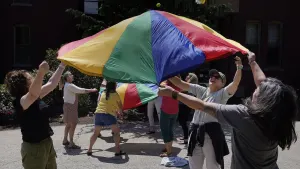More Stories
Coronavirus infections have now surpassed 90 million confirmed cases around the world.
The number of infections worldwide has doubled in just 10 weeks, according to Johns Hopkins University. The U.S. leads the world in both cases and deaths, with more than 22 million cases and 374,000 deaths.
As COVID-19 numbers continue to break records, the race to get people vaccinated is not going as quickly as health officials planned. So far, more than 22 million vaccines have been distributed in the U.S., but only about 7 million doses have been administered.
It is up to the states to figure out a vaccination distribution plan. Starting today in New York, people in group 1B are allowed to start getting vaccinated.
That group includes teachers and education workers, first responders, public safety workers, public transit workers, and people 75 and older.
The same group of people in New Jersey will also be eligible for vaccines next, but so far no timetable has been announced.
Connecticut is also finalizing who will be next to get the vaccine and when.
This morning, News 12's Elizabeth Hashagen was joined by two people who are now eligible to get the vaccine. Mike Lillis is the president of the Lakeland Federation of Teachers in Westchester. And Kathy Dein is the president of the North Babylon Teachers Organization.
Teaching is hard, teaching in the pandemic is even harder. There is so much to juggle for students, parents and educators.
How is it really going inside the classroom,
and at home for the students learning online? Below is what Lillis and Dein
say:
The pandemic has become emotionally and physically draining for educators themselves. It has quickly become a collective cry for help, with demoralized teachers saying they felt "defeated," "overloaded," "terrified," "ignored and frustrated." Below is what Lillis and Dein have to say:
How do you think our schools are doing with pandemic education? Answer our question on Twitter:
In person learning provides academic and social-emotional support. There are students with food insecurity, and issues with access to technology. Educators are trying to ensure children and families have the resources they need. Dein discusses what it's like at her district:
In a recent survey by the National Education Association, the country's largest teachers' union, 28% of educators said the coronavirus had made them more likely to leave teaching or retire early. That weariness spanned generations. Among the poll respondents, 55% of veteran teachers, with more than 30 years of experience, said they were now considering leaving the profession. So did 20% of teachers with less than 10 years' experience.
More from News 12
1:28

5 simple steps for long-term benefits to your health and heart
1:32

8 tips for working safely during hot weather
3:31

Guide: Ways to set your child up for financial success
3:18

Guide: The importance of good sleep and how to get it

Guide: Mental health resources available in the tri-state
9:36
